Steve waves goodbye to the long-term Yamaha Tracer 9 GT+ but not before one last blast
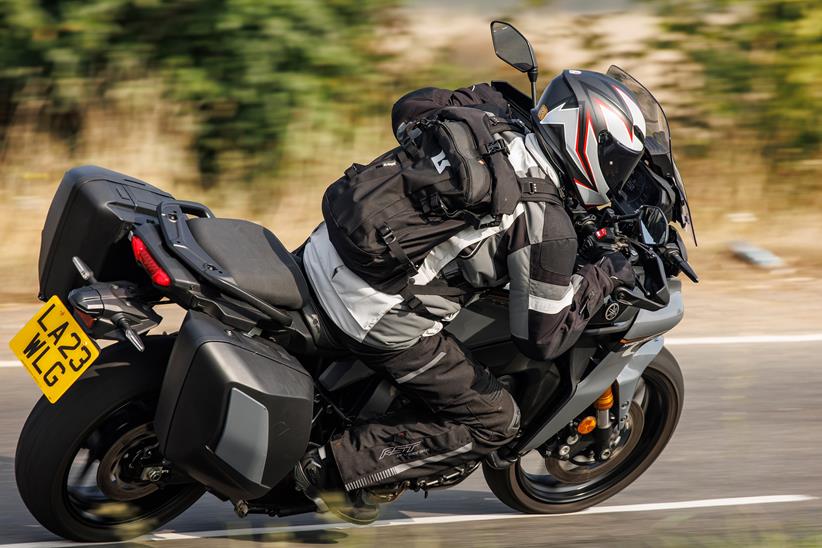
Fibula back in the as-nature-intended one piece, I nabbed the keys to the Tracer 9 GT+ back from Rich for one more go before the Yamaha mothership came to snaffle it back to base. After nearly two months of not riding and with Rich’s observations in mind, had my feelings changed?
While I’d never really considered the Tracer as being built ‘up’ from an MT-09, Rich is right. There’s a compactness to the bike that makes all its added on touring bits appear over-stretched. But being a human of average proportions (5ft 9in, 73kg) the Tracer is a great fit, no, better than that – it’s ergonomically perfect for me. Reach to the bars, pegs, seat (lower position) are all exactly where I need them.
The CP3 triple is one of the best engines around. Smooth power, revvy, addictive induction roar and lively on the throttle, it’s a bike that wants to go. Some of my favourite roads were eaten up with just the right kind of exhilaration. Never wild, never unsettled; the Tracer’s fantastic semi-active suspension working imperceptibly hard.
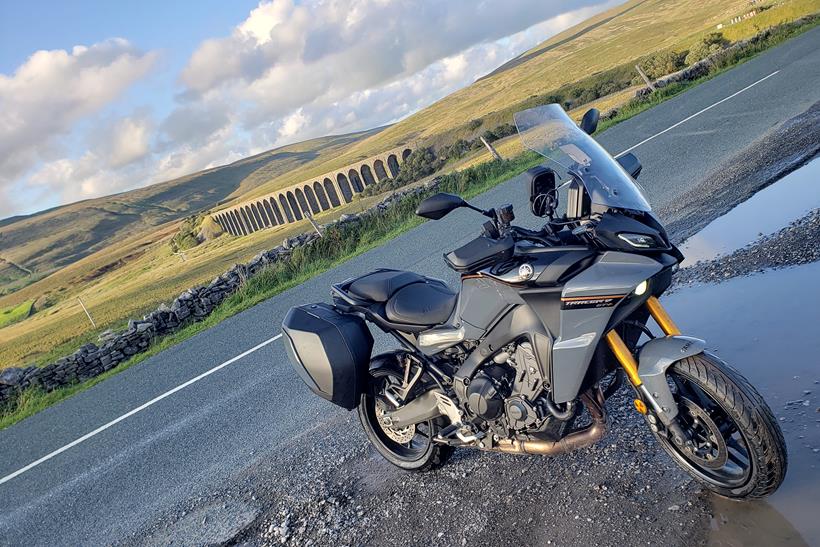
It’s not perfect. The screen, now easily adjusted with one hand, is noisy. While the finish is generally good, the exposed exhaust (especially the downpipes) looks like it’s done 10 winters, not one. The panniers, while they will take a size small full-face lid and are suited to the bike’s design, are limited by their shape.
The indicators and their poorly designed brackets are a constant source of annoyance and have spent more time flapping about than secured in place. The styling doesn’t give me the ‘oohs’ when I swing the garage door open. And let’s not forget the weird, vague handling from the slightly worn OE Bridgestones when I first got the keys. Although that was fully cured with a set of Pirelli Angel GT IIs, other riders have told me the non-OE Bridgestones would have likely offered the same improvement.
Having started 2023 on a Ténéré 700 World Raid before switching to the Tracer, the question of which one I’d buy – if either – inevitably rears up. The T7 was better suited to my type of riding, despite being too tall, too heavy and lacking all the Tracer’s toys and refinements. The Tracer – one of my favourite bikes since its inception in 2015, remains mega to ride anywhere, any time.
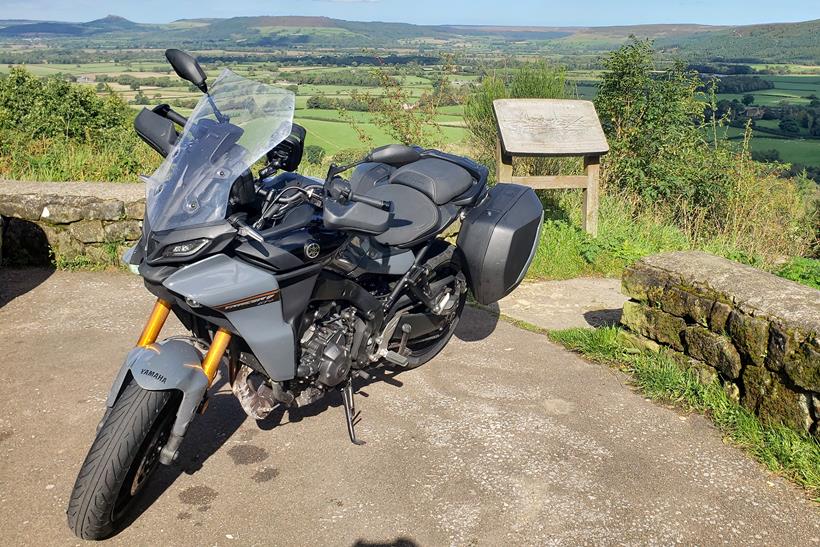
The upgrades the ‘+’ delivers over the base bike (excellent TFT dash, radar cruise, semi-active suspension, up/down quickshifter and radar-unified brakes) are all definite and distinct improvements, and while I won’t pretend £15K isn’t a significant slab of cash, there are very few bikes that are this good – or well equipped – as standard for the money. It’s hugely impressive and, best of all, great fun.
Rich steals the fleet Tracer from a stricken Steve
Published 15.03.2024
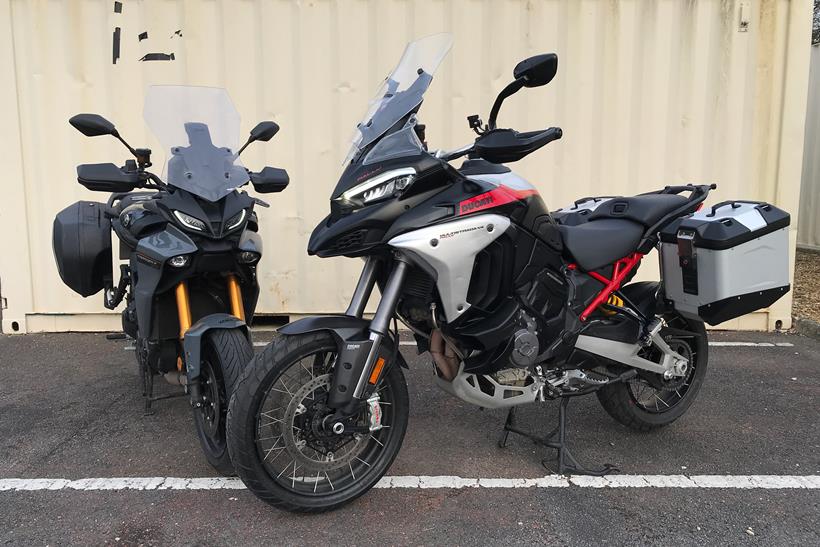
Words by Richard Newland
You would usually find Steve’s happy face peeking out at you for an update on the Yamaha Tracer 9 sports-tourer‘s latest movements, but having tried to get his leg to bend at a designated point which nature deemed better served by a nice straight bone in its original design, he’s not been able to ride this month.
Steve’s misfortune coincided with Ducati asserting that they really did own the Multistrada V4 Rally and wanted it back – so I’ve stolen the GT+ with no small amount of excitement and interest. Sorry Steve.
The Tracer 9 GT+ and Ducati’s V4 Rally aren’t trying to play the same game, but they do deliver a huge range of similar rider benefits – so while we wouldn’t ordinarily compare the two in a big test, it’s interesting to do so here, 250 miles after I nabbed the keys.
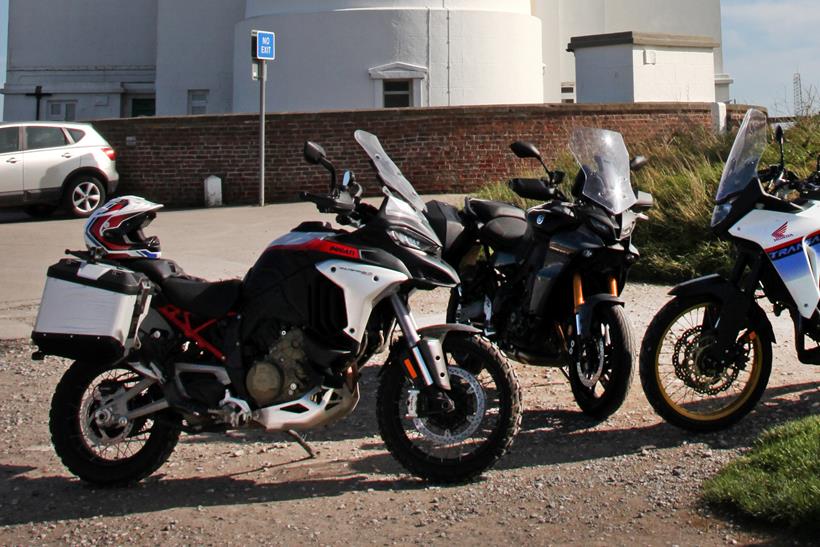
Jumping from one straight to the other, or just looking at them parked nose-to-nose, the difference in scale is clear. You climb on and off the Duke, swing a leg over the GT. You sit ‘on’ the Tracer, but ‘in’ the Rally. You’re in amongst the traffic on a GT – towering over it on the Rally.
In all aspects of mass and stature, the GT feels like a scale model by comparison. Is that a criticism? No, not really. It’s lighter and more manageable from the moment you hoik it off the sidestand, all the way up to fast direction changes, filtering agility, threading it down a nadgery back-road or popping it on the main stand. In every physical sense, it’s much easier to live with. The road-centric 17in rim sizes also mean it steers and corners like a normal road bike, delivering a far more lithe and engaging skill set.
As the miles start to accumulate, the differences in these two propositions start to glare. First is the price, obviously. The GT is £12k less than the Rally. Does that make it ‘cheap’, or the Rally ‘expensive’? Neither. Value for money is apparent in both bikes, and I’d score them identically (8/10) – which tells you a lot about the price/product equation.
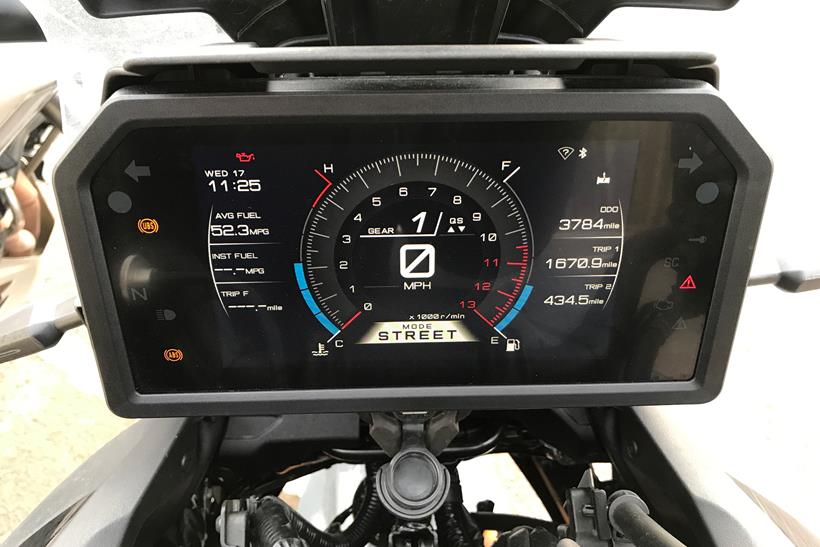
But ride the Rally, and it’s clearly a bike that was designed to be exactly what it is. Ride the GT and you’re always aware that it’s a naked MT-09 that some very clever engineers have worked hard to fabricate a sports-tourer from. But there’s no way to hide its origins – and every time you glance down and notice the top yoke nestling at knee height, you’re reminded.
In fact, in every dimension, it feels like a dressed naked. I’m 5ft 11in and riding it with the seat in the higher position (where it wobbles – yet doesn’t in the lower position), which compounds the sense of being ‘on’ the bike.
The bars sit on huge risers, the screen is super-long but barely high enough (and noisy), the triangle of room between bum, hands and head still feels like an MT-09, and all else that has been bolted on to make it a tourer feels, well, bolted on. The panniers aren’t a great shape/design, there’s no 12v power socket (there is a USB, but you can’t run heated kit from that), the headlights aren’t amazing on dipped beam, while the cornering lights are laughable, too.
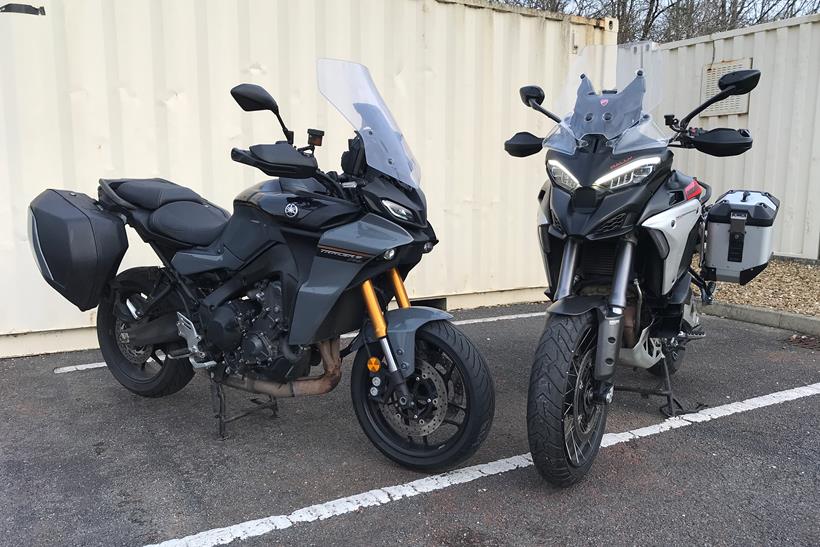
So it’s going well, then? Actually, yes. Despite all the niggly imperfections, I’m really enjoying the GT+, but that’s because it feels fun and a bit fruity, while also being practical. It’s all the brilliant silliness of an MT-09 for people who need to carry a few things, ride in bad weather, spend a whole day in the saddle, and don’t enjoy neck ache.
The CP3 inline-triple is the genius slice of glorious fruitcake it’s always been; the chassis is accurate and pleasing (the shock just about copes with my 17.5st); the exhaust note is cheeky; the big, clear and classy TFT and electronics packages are great… There’s a hell of a lot to like, especially on the move.
If you want a brand-new, fast, fun, agile and attractive sports-tourer for £15k, it’s one of the strongest options. Would I trade all the weaker areas for improvements at the cost of a higher price? No. You could add complexity and cost trying to mask its origins further, but I’d take it as it is, have a blast riding it, then make my own minor mods where it matters.
Long-term Yamaha Tracer 9 GT+ test | So you can connect your phone to your bike. But what for?
Published 26.01.24
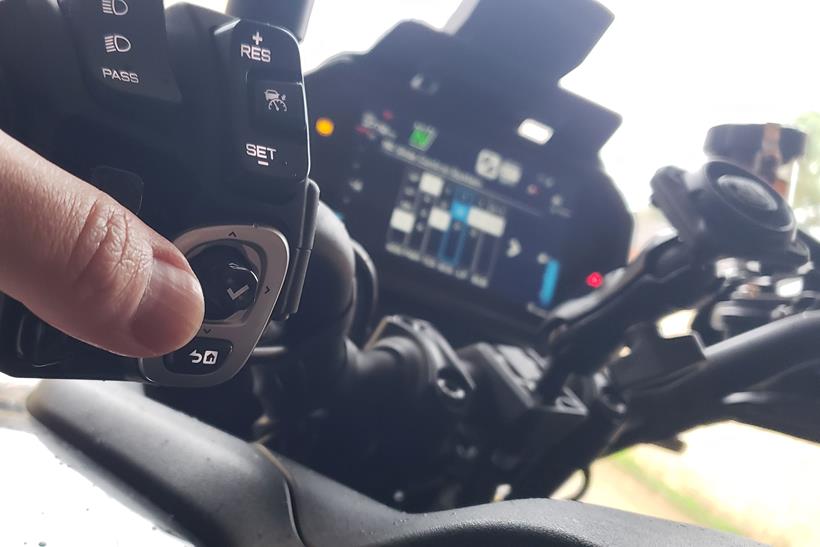
I’m a bit of a nerd when it comes to tech – which the Yamaha Tracer 9 GT+ comes packed with. I like pushing buttons and making things do stuff. But when that tech doesn’t perform a function that enhances my life, I can turn all ‘grumpy old man’ about the unneccessariness of it all.
Neevesy (Kawasaki H2 SX SE+), Rich (Ducati Multistrada V4 Rally) and I have all talked about this year’s must have whosit – radar cruise. And while you definitely don’t need it, it’s a ride-enhancing device with genuine safety benefits.
But what I hadn’t done until recently was connect my phone to the T9GT+’s excellent TFT dash (a huge upgrade over the standard Tracer’s display). And I’m a bit disappointed.
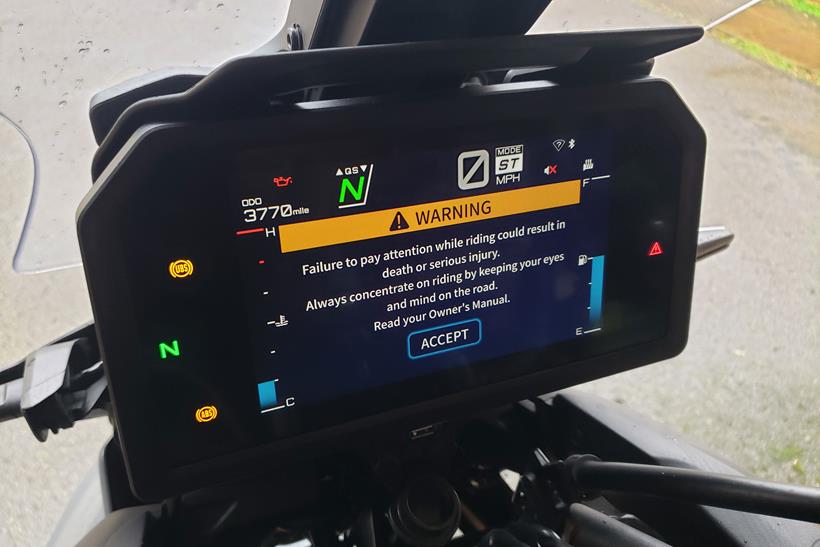
I’m a biker who enjoys the meditative isolation of being the sole occupant of a helmet, and it’s been several years (and children) since my wife and I had life-space for any two-up touring. So I no longer use a Bluetooth headset when riding. Meaning that being able to connect my phone to easily, if a bit awkwardly, navigate a Spotify playlist or my phone book through my bike is of no benefit.
Yamaha’s MyRide app lets me check the weather, but I’ve generally done that before leaving to make sure I’m dressed appropriately for the ride.
What I’d most like to do is put Google Maps, with its excellent navigation and live traffic reporting straight onto my bike’s 7in telly. But it doesn’t do that, and while it does have a very attractive sat nav option, it’s only with a Garmin subscription. So I have my phone in a ’bar-mounted waterproof case, which works perfectly fine but means there’s a chunk of my bike’s functionality I get zero use out of.
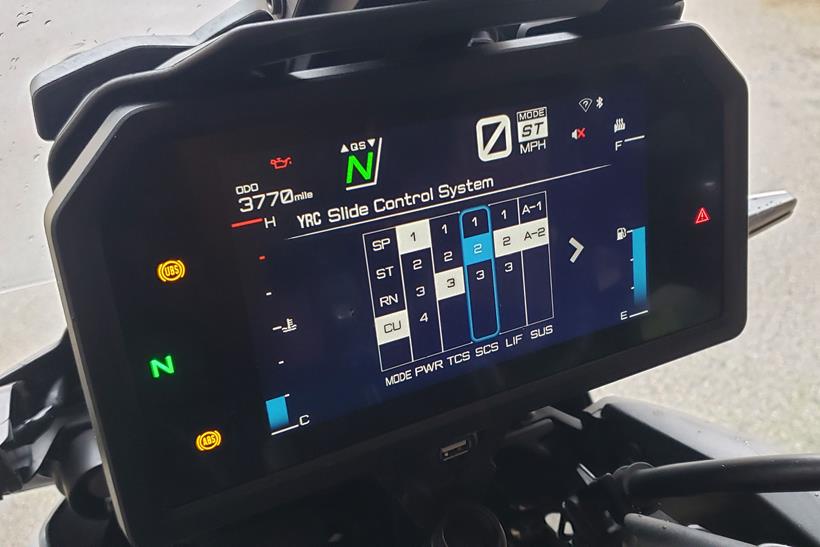
Something else I’ve been frustrated by is not having a range calculator – especially on a tourer. There’s a ‘Trip F’ meter on the main display but it shows as dashes until you hit the reserve and counts up when the fuel level’s last bar starts flashing. I’d swap all the phone connectivity for that to tell me the distance to empty.
Nothing’s ever perfect and these small observations don’t really detract from what a bloody brilliant ride the GT+ is. But they are the small chinks in the Yamaha’s seemingly flawless armour.
Two months with the Yamaha Tracer 9 GT+ reveal the bike’s finer (and not so fine) points
Published 29.11.23

Yamaha’s top-spec sports-tourer has been gathering plaudits from riders, winning minds (if not hearts) any time it’s compared to its rivals. But after a couple of months of living with what should, on paper, be my perfect bike it’s time to get down into the details and dish the dirt on whether the T9GT+ really does tick all my boxes.
It’s two bikes in one
Forget the headline tech; the single most impressive thing about the Tracer 9 GT+ is how broad its range of abilities is. Remember when sports-tourers were overweight sportsbikes with high bars, and sat in that stodgy middle-ground of being average at both? Not the T9.
Plod in a leisurely fashion and its roomy riding position, smooth but characterful engine, clever suspension, and multiple rider modes all work so well you’d almost think it’s as boring as its battleship grey paint.
Find the right road and wind it open though and the GT comes alive. It’s refined and composed (as you’d expect of a model several generations into its development) but scores the rare double of being the bike you want to get there on – and the bike you want to be on when you get there.
Flashers on the loose
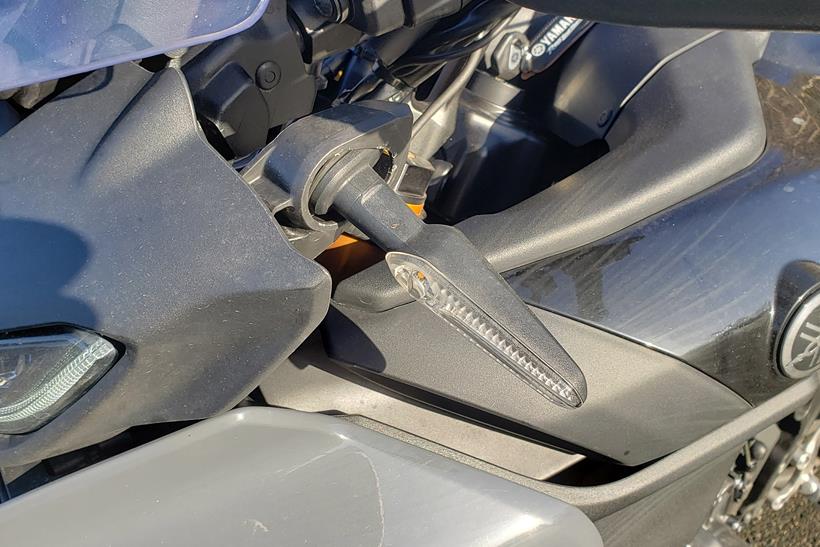
On such a complete package as the GT+, and whether you’ve gone all in for 15 large ones or £150 a month on PCP, it’s aggravating if not unforgivable that at any given moment you’ll find your front indicators flopping around like a sad puppy’s ears. It seems a common problem on modern Yams, as if the rubber bung doesn’t have a big enough lip. The slightest brush past in my garage and they’re out again, and an utter bastard to secure back in the bracket.
What’s on the menu?
The GT+ has redesigned (wonderfully backlit) switchgear to incorporate dash functions and cruise control. The layout is logical and clean but on the road my brain can’t tell the difference between the indicator and the menu joystick. I also always push a door that says pull so it’s likely all me, but I’ve not had trouble getting used to the switches on other bikes. They’re perhaps too similarly sized and placed?
Eye of the beholder
I like to think I’m not superficial, but while the Tracer’s personality when it’s being ridden is among the two-wheeled world’s best, it’s styling… well, isn’t. It’s distinctive, sure. But it doesn’t make me ‘oooh’ when I open the garage door. It’s no fridge, but it’s a barrier to me loving it that also means I’m less inclined to give it that extra buff when cleaning (which itself is a pain due to all the facets and angles and glossy black paint). I’d trade some ability for a splash of MV Agusta Turismo Veloce swooning any day.
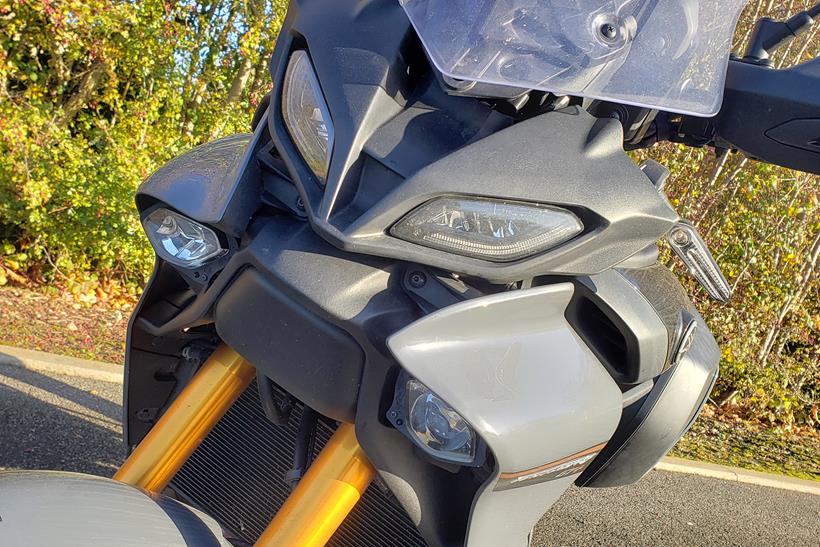
Posh bouncy bits
Being of average size and weight, it’s not often I trouble standard suspension settings. Everything I ride seems kinda fine to me. I can tell posh from cheap, but I liked the much-derided original Tracer 900 suspension for its lively boinginess. The GT+’s ultra-clever KYB semi-active suspension, while feeling noticeably different between modes, delivers a completely composed ride all the time – plush, stable and without any need for me to twiddle anything.
I’d take the T7
To me, big-mile bikes aren’t all about the riding day, it’s the day after. Do I ache? Could I smash out another 500 miles? Having spent three months with a Ténéré 700 World Raid, which has none of the GT+’s high-level tech, on the T7 I had no bodily complaints. The T9’s sportier nature, tighter ergonomics and buffety screen gave some neck and shoulder discomfort. This revelation caught me by surprise, but despite the lack of toys and heating, it’s the T7 (literally) all the way.
That tyred feeling – Steve upgrades the Yamaha Tracer 9 GT+’s OE rubber
Published 18.10.23
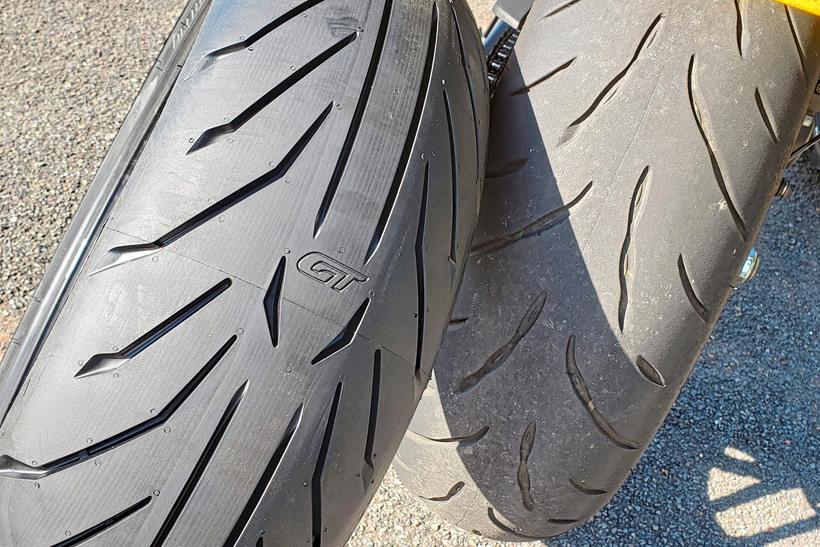
Last time round, I mentioned the Tracer’s weird front-end feeling – falling sharply on initial turn-in, while having a tendency to feel like it was washing out and running wide in corners even though it was holding a line. I was getting used to it, but I didn’t like it.
A simple and obvious bit of troubleshooting involved fitting a pair of Pirelli Angel GT II sports touring tyres. I’ve used them on several bikes and wanted to see if they improved the feeling from the Yamaha.
The OE Bridgestone T32s were a couple of thousand miles old and the rear was a bit square so I expected to feel some improvement, but I was amazed to find that both concerns had vanished completely. Turn-in was instantly sharper, but with a predictable and progressive roll through the whole turn with much more feedback coming through the bars.
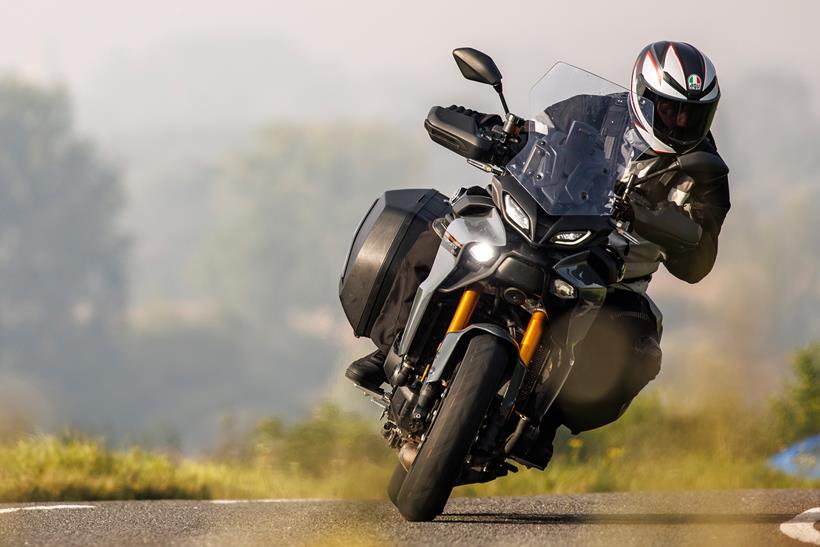
And while the Tracer held a line fine before, it was something I had to assume was happening because I had no feel. The Angel GTs’ roadholding is excellent in all conditions and I have much more confidence in the front now because I can feel what’s going on. They’ve really improved my relationship with the T9 when I want to crack on. They’re just marvellous.
As Rich and Gareth have already written about, our recent 500-mile, 15-hours-in-one-day tour taking in Flamborough Head, the Moors, the Dales and the Peaks proved the perky 890 triple has the chops for a proper full day’s riding. It may sound like a long way, but doing a big ride like this really helps you understand how you and your bike perform over distance, and to work out the scale of your horizons.
The Tracer is fantastically comfy, a little short on range (average 52mpg from its 18-litre tank means a stop every 200 miles or so), and annoyingly noisy. I’d previously thought the screen was pretty good, but I hadn’t ridden as long and was wearing a different lid. High or low position changes the noise but doesn’t reduce it. It doesn’t spoil the ride, but you’d expect better. Otherwise, the bike is great fun.
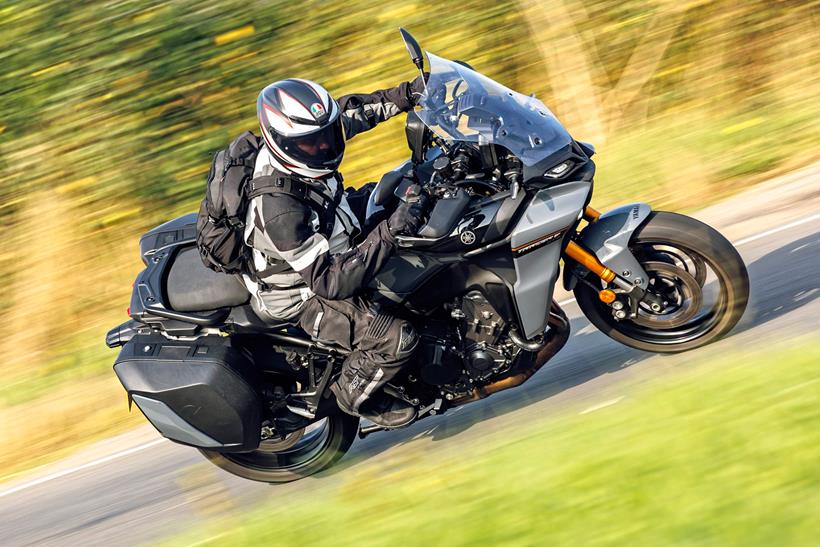
When Rich and Gareth took their adventure bikes off along Rudland Rigg, I explored the GT’s sportier side by taking the B1257 from Helmsley to Stokesley in a 20-mile rollercoaster thrill ride so good, I turned round and did half of it again, knowing the other two would be a while on the greenlane.
This is why I love the Tracer so much – a comfortable, practical tourer with all the toys you need for a good day’s riding, but also capable of properly getting on with it when you want to. Sports-tourers have always seemed to me like a compromise that achieves neither. The T9 GT nails it, and then some.
Smitten Steve swaps the Ténéré 700 World Raid for a Yamaha Tracer 9 GT+
Published 13.09.23
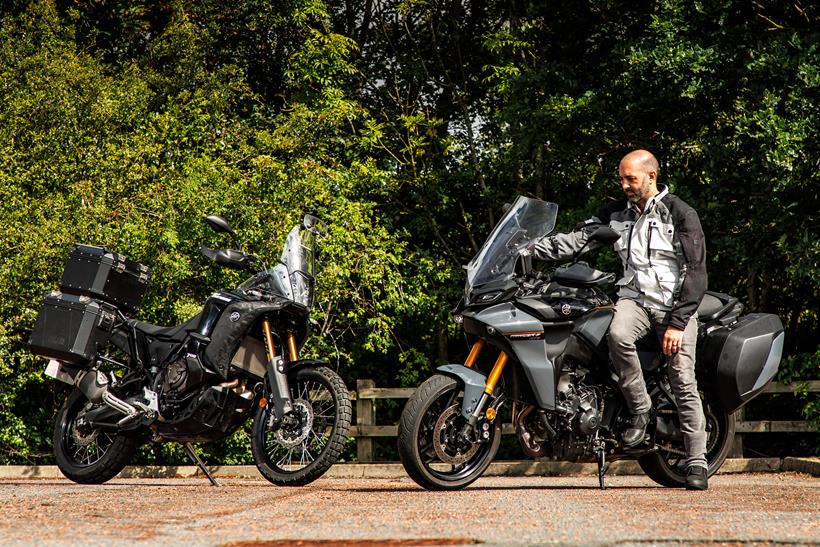
I’ve never met a Tracer I didn’t like. In 2015 I rode the then-new 900 off the Yamaha stand at the MCN Festival and piled on a year’s worth of mileage in three months, including two-up touring in Scotland and France. When I spent two days riding the Tracer 9 in Wales in 2021 it blew me away with its huge mile-smashing and grin-inducing ability. So, with its best-in-class tech, is the new GT+ version much of an improvement?
Having put a decent chunk of miles on the Ténéré 700 World Raid over the last few months, the Tracer feels so different, comparison is almost pointless. Significantly lower, I can get both feet flat on the floor and the first few miles demand serious mental recalibration.
In its understated grey, black and gold paint the 2023 GT+ has a premium and classy allure, while the new 7in TFT dash’s crisp graphics and clean arrangement are a huge improvement over the old ‘Short Circuit’ split display. Switchgear and menu options all feel intuitive (if only the switches were backlit, though), and while some riders had previously warned me of a noisy screen, I find it works for me in both positions (which I can adjust one-handed on the move). I put this down to being average-development-rider sized.
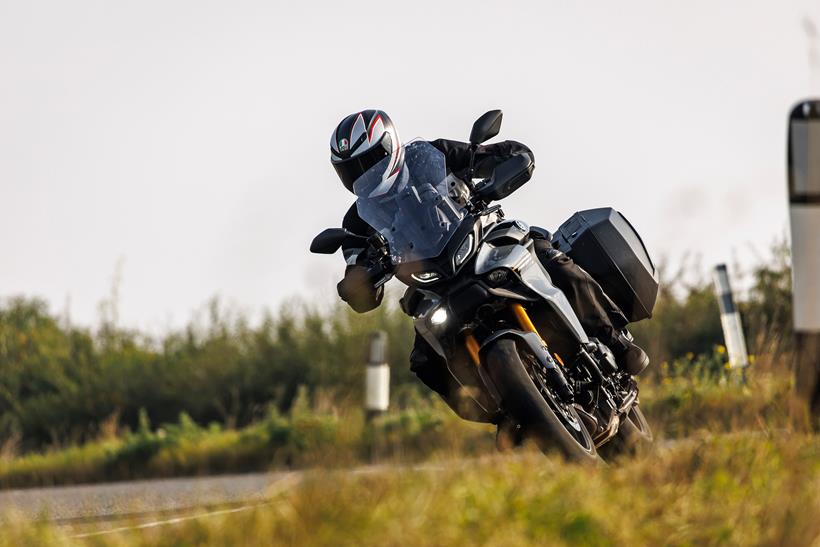
The extra 47hp from the CP3 triple over the T7’s slightly feeble parallel twin makes the T9 feel seriously rapid. Turning-in feels sketchy at first as the bike wants to fall on its side quickly with the steering feeling not unlike a Kawasaki Z1000SX.
This is no box-fresh bike, having been used for road testing duties by MCN and its sister mags before I got the keys and maybe the sightly squared Bridgestone T32 tyres or previous rider’s suspension settings need attention. There’s also a slight judder through the clutch lever when pulling away, with the Tracer asking for just the right combo of throttle and slip to make a clean getaway. I’m told it’s normal, but it doesn’t feel great, and takes some getting used to.
With the addition of Adaptive Cruise Control (ACC), radar-linked Unified Brakes (UBC), riding modes, KYB semi-active suspension and up/down quickshifter, the GT+ has seriously impressive spec (and is, pleasingly only £149 a month on PCP if you are buying on finance), but hasn’t lost any of its lively, fun side.
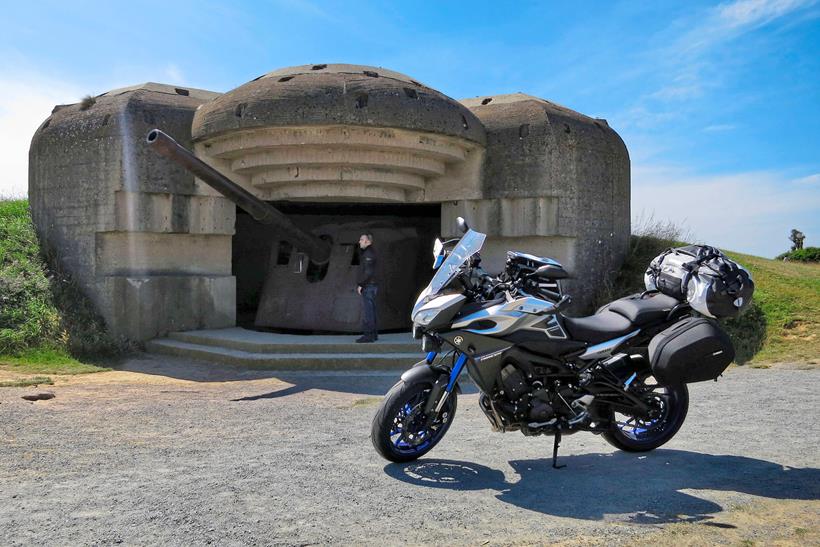
Seat, bar and peg position all seem to fit me perfectly (as Tracers always have). The ride is purposefully firm and the bike’s ability to shift character from up-for-it sporty to comfy cruising makes it one of the best sports tourers I’ve ridden. Yamaha list the seat as ‘extreme comfort’, and it’s hard to disagree on our first 100-mile trip, though it’s broad, scooped ‘old bike saddle’ shape only really offers one position.
The styling is still an acquired taste, but after the initial shock we all got when it was revealed three years ago it’s grown on me – most likely looking through the rose-coloured lens of how many great rides these bikes have given me.
Everything new or upgraded on the GT+ is better than the equivalent on what was already a brilliant base model. Can you tell I’m a fan?
Radar cruise: Does it work?
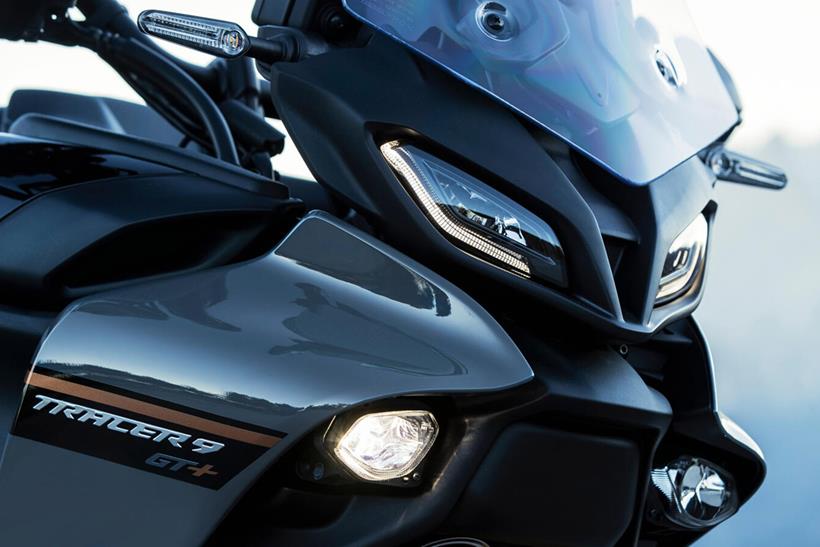
The GT+’s Adaptive Cruise Control (ACC) and radar linked brakes are amazing. As a test, I set the cruise to 80mph in a 60 and used the system to maintain the speed limit at a safe distance to the car in front. As we both veered onto a slip road uphill to a 90° bend and down onto a motorway, the radar controlled my braking, speed and distance perfectly until I pulled out to overtake the car. At which point it accelerated me up to cruising speed.
As a demonstration of the system’s ability it proved itself intelligent, safe and a genuine benefit. If deceleration is abrupt enough, the braking and flashing orange warning on the dash are enough to bring you to your senses. And unlike some systems, the Tracer’s neat trick is maintaining speed past slower vehicles if your indicator is on. It’s honestly brilliant.



















